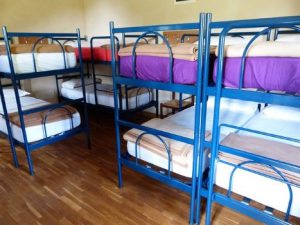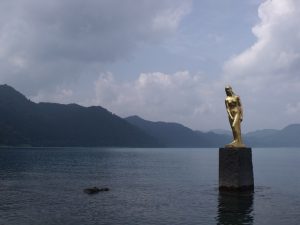
From pixabay.com / © Hans
I’ve been meaning to write about youth hostels since last July. That was when the journalist John Harris penned an article for the Guardian that was both a tribute to and a lamentation about them. Harris reported: “The Youth Hostel Association of England and Wales (YHA) has announced the sell-off of 20 of its 150 hostels, and identified a further 30 for possible uploading over the next three years – which, in total, would mean the loss of a third of its properties. Its spokespeople blame ‘pandemic shutdowns, the cost-of-living crisis and steep inflation.’” He also observed: “Insiders… talk about how Brexit has hugely reduced the number of school trips to the UK from Europe, thereby hitting a crucial part of the YHA’s revenue.”
For a long time, I was a member of the Scottish Youth Hostels Association (SYHA), or Hostelling Scotland as it is now, and I assume the situation north of the border is bleak too. The youth hostel in Melrose, the one closest to my home address in the Scottish Borders, ceased trading some years ago. Indeed, as far as I know, the Borders region has only one SYHA hostel these days, in Kirk Yetholm. It’s insane when you consider how the Borders is choc-a-bloc with beautiful countryside and offers great opportunities for walking, hiking and cycling. It should have half-a-dozen such hostels offering holiday accommodation for outdoor enthusiasts who are on a budget.
The first youth hotel association I was a member of, though, was the Northern Irish one. I joined it during the summer of 1982, when I was 16 and temporarily employed on an uncle’s farm in County Tyrone. I was making plans to go to the French-speaking part of Switzerland that October and work as a grape-picker, and then travel around Europe, and as I didn’t have much money to finance this it made sense to get a youth-hostel membership card that’d allow me to use any cheap European hostel I came across. The autumn arrived, I headed abroad and I ended up staying in a slew of hostels. These included ones in Lausanne, Fribourg, Grindelwald, Lucerne and Zurich in Switzerland, in Vaduz in Liechtenstein, in Munich, Ulm, Freiburg and Bonn in Germany, in Brussels in Belgium and in Rotterdam in the Netherlands.
To my young, innocent mind, it seemed marvellous that every city and decent-sized town in Switzerland, Liechtenstein – well, Vaduz was the only town in Liechtenstein – Germany, Belgium and the Netherlands should have an establishment where you could get basic but adequate accommodation for a price that was as cheap as the proverbial chips.
From those 1982 wanderings, the Grindelwald youth hostel remains most vivid in my memory. I arrived in the Alpine town one evening when everything was shrouded in fog as well as in darkness and I had no idea what my surroundings looked like. The next morning, I woke in a hostel dormitory, put on some clothes and emerged onto a balcony. The hostel was sited high on one side of a valley and across from it, confronting me, was the vast craggy awesomeness of the Eiger. Wow!

From pixabay.com / © Goodlynx
There were downsides, of course. At the time, many of those hostels were strictly run – especially the Swiss ones. They had ten o’clock curfews and the wardens showed their guests as much humanity as Victorian schoolmasters showed their pupils in Charles Dickens’ novels. In one hostel, I noticed some graffiti scrawled on the inside of a toilet door. “The warden,” it said bluntly, “is a fascist.”
I also met a wide range of humanity in those places. In the common rooms, dining rooms, kitchens and dormitories, I had conversations with philosophers, poets, communists, anarchists, rabid Irish nationalists, belligerent English football hooligans, drunkards, thieves – a sweater was swiped from my rucksack in Brussels – and more. I met an old Australian guy who talked about the months he’d spent roaming the Sahara Desert and hanging out with the Tuareg. I met an American woman who couldn’t understand a single word I uttered – I ’d say something in my hybrid Northern Irish / Scottish accent and, panic-stricken, she’d look to her travelling companion for a translation. In Rotterdam, on my way from the station to the youth hostel, a guy pulled a knife on me and tried to rob me, and then at the hostel I was consoled by a devout Dutch Christian. After telling him about my misadventure, he exclaimed, “Thank God for saving your life!”
The following summer, I worked in Switzerland again, this time on a farm, and I did a little more hostelling – in the Swiss cities of Zug and Berne and in the French coastal town of Boulogne, from which I caught a ferry back to the UK. And soon afterwards, I spent a couple of weeks tramping around England’s Lake District and stayed in several youth hostels there: Ambleside, Keswick, Grasmere, Windermere, Borrowdale.
It wasn’t until 1988, when I was in my early twenties, that I was reacquainted with the youth hostelling world. This was shortly after I’d graduated from college in Aberdeen. Needing employment for the summer, I was taken on as a seasonal warden at Aberdeen Youth Hostel on Queen’s Road. I worked under the supervision of the hostel’s head warden, the relaxed and affable Bill Dick, and alongside fellow wardens Andrew Gordon and Paul Hunter. It was a pleasant summer on a personal level – even my memories of wrestling a lawnmower over the building’s extensive and unruly back garden seem idyllic now. That said, it was a traumatic one for Aberdeen generally because, on the night of July 6th-7th, the Piper Alpha oil platform exploded in the sea 120 miles north-east of the city, resulting in 167 deaths. In fact, some of the guys staying in the hostel were looking for employment in the local oil industry. Before they did anything else, they had to complete a Helicopter Underwater Escape Training (HUET) course at the city’s Robert Gordon Institute of Technology (now Robert Gordon University) and they’d tell me about how they were strapped inside a mock-up of a helicopter fuselage and then dunked in a giant tank of water.
Bill Dick was a laidback boss but one thing seriously worried him. That was the thought of a fire. The premises contained cheap plastic furniture that might give off toxic fumes if it burned and, also, the external fire escapes were showing signs of wear and tear. He’d raised these issues with the SYHA but so far nothing had been done about them, presumably due to a lack of funds. Thus, Andrew, Paul and I had the procedures to follow in the event of a fire, and the locations of the fire extinguishers and fire alarms, drummed into our heads.

From wikimedia.org / © AlasdairW
One evening, just after eleven, I was completing a shift at the front desk. The hostellers all seemed to be in bed and Bill and the other staff had gone out for a drink, save for Nicky, the night-porter, who was upstairs, and Mary, the cook, who was finishing up in the kitchen. I was wrestling with the usual end-of-day headache of counting up the till – not an easy job because youth hostels in those days (and maybe still now) used elaborate systems of discounts and vouchers that meant guests were often paying less than the official prices. Then an agonisingly loud, shrill noise pierced through the building – the fire alarm.
I grabbed the phone and dialled 999. Yelling above the noise, I gave the emergency-services operator our address. By this time, guests were shambling down the stairs, into the front lobby, wearing pyjamas, dressing gowns and other nighttime attire. “Get outside,” I ordered, even pushing a couple of them towards the door, “get outside!” Mary appeared from the kitchen – Nicky, it transpired later, was detained because he’d been in the middle of using the loo when the alarm went off – and we headed into the building’s interior in search of the fire. We didn’t find it. We did, however, find a fire alarm with its protective glass broken. Some wanker, who’d probably been in the pub all evening, had smashed it and pressed the activation button inside for a laugh. Meanwhile, the windows at the front of the hostel brimmed with dazzling white light, as if the mothership from Close Encounters of the Third Kind (1977) had just landed in the front yard. It was actually the headlights of a couple of engines arriving from Aberdeen Fire Station.
Later, after I’d filled in forms confirming the fire had been a false alarm and a number of disgruntled Aberdonian firefighters had returned to their vehicles, Mary remarked, “My hands are still shaking.” I realised mine were too. I felt pretty stupid about summoning all those firemen for nothing, but when Bill returned and heard what’d happened, he assured me I’d done the right thing.
I’m sure that later, as health-and-safety regulations became more stringent, the SYHA sorted out the hostel’s furniture and fire escapes. However, that’s academic now, as the the building was put up for sale in 2022 and I assume Aberdeen, like so many other places, is now youth-hostel-less.
During the 1990s I lived in Japan and in 1995 I got a temporary job as a researcher for the Fodor’s Guidebook company. My assignment was to update and rewrite two chapters in the previous edition of their Japanese guide, about Hokkaido and Tohoku, for a new edition. As Hokkaido and Tohoku constitute the northern third of the Japanese landmass, this involved a lot of travelling around. To cut costs, I stayed in several youth hostels – in the cities of Hakodate, Aomori, Hirosaki and Akita, and by Lake Tazawa, which is up in the mountains to the east of Akita City and is Japan’s deepest lake. The hostels were pretty basic but, crucially, they were warm – I was carrying out this job in March, when northern Japan was still in the grip of winter and buried in snowdrifts.

From pixabay.com / © hydroxyquinol
My visit to the Lake Tazawa youth hostel was a spooky experience. I’d phoned earlier in the day from Akita and booked a bed there – a friendly-sounding lady had answered and confirmed the booking – but it was dark when I arrived on the train. To get to the hostel, I had to walk along a silent, lonely road that had snow banked high along its sides. Indeed, the wind had sculpted the tops of those snowbanks into weird, twisted shapes that in the glow from the sporadic streetlights, and the attendant shadows, looked like props from Ridley Scott’s Alien (1979). Finally, I reached the hostel, entered it… and found it totally deserted. Its lights were on, but however much I wandered around its interior, and however loudly I shouted, I couldn’t locate another soul.
Yet I had spoken to a real human being on the phone… hadn’t I? By this time, with the wind moaning outside and flinging shards of snow against the hostel’s walls and roof, I’d stopped thinking about Alien and started thinking about the traditional Japanese ghost stories famously transcribed by Lafcadio Hearn. Maybe I was a character in one of those ghost stories now. Maybe one also involving the yuki–onna…
But after staying there for a bewildering half-hour, I ventured outside again – and discovered a second building close by, one I hadn’t noticed earlier. Inside it, I found the youth hostel staff, including the woman I’d spoken to earlier. What I’d entered first of all had been an annex building of the hostel. I hadn’t been ensnared in a wintry Japanese ghost story after all.
After Japan, I lived in East Anglia – one of the loveliest parts of England – on three occasions. These were for a couple of months in Norwich in 1998, while I was doing a course to get a teaching diploma; for half-a-year working in County Suffolk in 2002; and in Norwich again from 2008 to 2009 while I was doing a Master’s Degree at the University of East Anglia.
When I first turned up in Norwich in 1998, I checked into the town’s youth hostel assuming I would then find normal accommodation in a flat or bedsit for the duration of my diploma course. However, I soon decided that, because it was off-season, I might as well just stay in the hostel, attend the course and do its homework assignments in the usually-quiet common room. Elsewhere in East Anglia, I have fond memories of staying at the youth hostel in the Suffolk village of Snape and, from there, exploring the tidal estuary of the River Alde; and using the hostel in the north Norfolk town of Wells-next-the-Sea as my base while I went walking in the local salt marshes. Sadly, all three of those hostels, Norwich, Snape and Wells-next-the-Sea, appear to be defunct in 2024.
Also, from 2002 to 2005, I worked in Newcastle-upon-Tyne. My family didn’t live that far away from Newcastle, being on the other side of the English / Scottish border, and by that time I’d become an ardent cyclist. Thus, several times, I cycled north from Newcastle to visit my folks. The journey took the most of two days by bike and I’d break the journey by staying in youth hostels along the way – either in the midge-infested village of Byrness just south of the border in England, or in Kirk Yetholm just north of it in Scotland. The Byrness Hostel – yes, you guessed it – has given up the ghost since then too.

I also cycled westwards from Newcastle, visited the Lake District again and stayed in some of the youth hostels I’d been in two decades earlier. While returning to Newcastle I had another eerie hostel-related experience. Again, I planned to break the journey, this time spending a night in the hostel in Alston, which is said to be the highest market town in England. To get there, I cycled through Penrith and, afterwards, had a gruelling time getting my bicycle up the mercilessly steep A686 road to Hartside Pass. It was evening-time when I finally reached the pass and by then I felt about 200 years old. But, unexpectedly, the road descended gently for the next few miles. I coasted along it, barely pedalling, gradually getting my strength back. The ride was also discombobulating, though, because the light was fading and everything around me was shrouded in mist. Finally, I scooted into Alston. The town had a dream-like quality – almost phantasmagorical as it materialised out of the dusk and mist in what felt like the middle of nowhere.
Incidentally, I’ve just looked up the Alston Youth Hostel and – hurrah! – it’s still on the go.
After that, I stayed in youth hostels only a few times more, in Edinburgh and London when I had a plane or train to catch early the next morning and didn’t feel like splashing out on a hotel-room. In the last decade I haven’t youth-hostelled at all. Nowadays, I’m able to afford less spartan accommodation and, as I’m old, cranky and ‘high maintenance’, I doubt if a youth-hostel bunkbed would meet my expectations for comfort. Still, though they were called ‘youth’ hostels, I was frequenting them into my forties, long after my youth had ended. I certainly got plenty of mileage out of them.
Now, as John Harris observes, they appear to be heading for extinction, in Britain at least. Yes, I know, modern phenomena like Airbnb have vastly widened people’s options when they search for and choose accommodation. But that’s only if people have money. If you’re to believe the figures, some 12 million people in Britain – 18% of the population – are living in absolute poverty, including 3.6 million children. I assume the majority of them live in the cities. I doubt if the existence of Airbnb and the like enables them to travel far from home and see much of the countryside. Now more than ever, young folk need the humble youth hostel as somewhere to provide a warm berth and a roof over their heads while they wander, and explore, and broaden their horizons – cheaply.
And yet, though they’re so needed, youth hostels are being allowed to die out. That’s another indictment of Britain in 2024, a country where the powers-that-be know the cost of everything but the value of absolutely nothing.

From pixabay.com / © Sabrinayrafa
